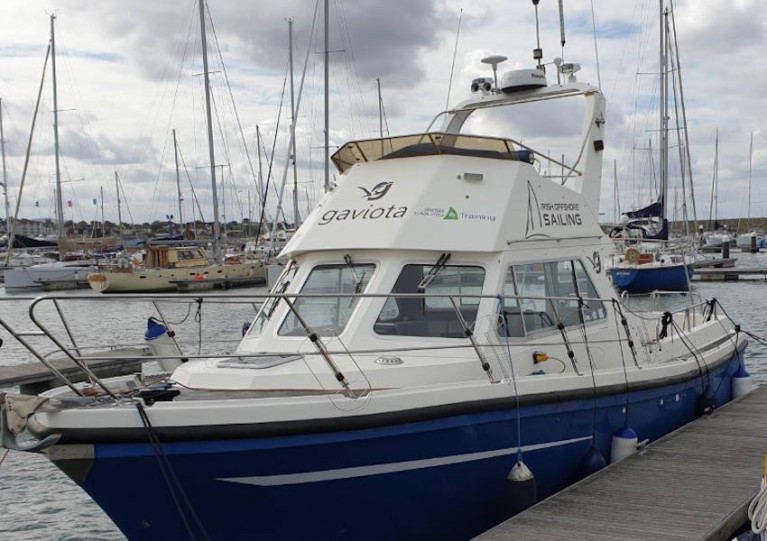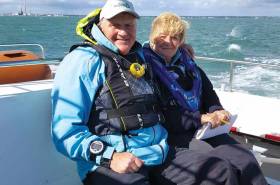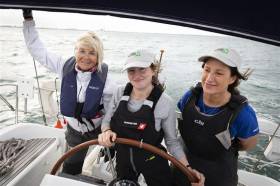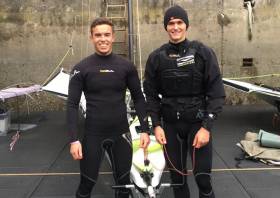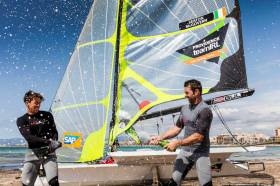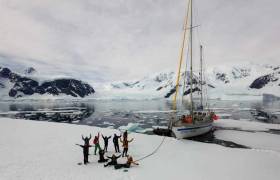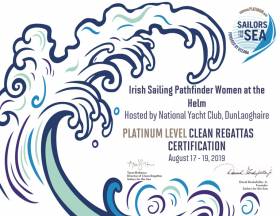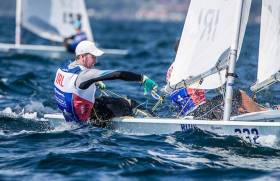Displaying items by tag: Irish Sailing
Irish Offshore Sailing has extended its sail training and yacht racing programmes for 2020 with a full range of motor cruising courses on a specially fitted-out and coded motor yacht.
Skippered by Yachtmaster Instructor Peter Beamish, the training boat is a Lochin 333 Harbour Pilot named Gaviota. Fitted with twin Perkins 300 HP engines, she has a cruising speed of 16 knots and a top speed of 24 knots.
Fully equipped with modern instruments and electronic engine controls, Gaviota is commercially coded in Ireland and the UK, and has all the safety equipment required for up to 10 people
Irish Offshore Sailing is now the only Irish Sailing and RYA recognised training centre in Ireland that can offer motor cruising courses which include Start Motor Cruising, Helmsman, Day Skipper, Advanced Pilotage, Coastal Skipper, and Yachtmaster Offshore Power.
See IrishOffshoreSailing.com for the full schedule of all motor cruising courses in 2020. And for more information please contact Peter Beamish on 087 672 9999.
Three Years at the Helm of Irish Sailing
This is my last blog as Irish Sailing President; where did that three years go? There have been both challenges and successes but what I have enjoyed most has been getting to visit sailing centres around the country and meeting the people who are the mainstays of our sport – the volunteers, organisers and sailors who make sailing accessible, safe and, above all, fun for anyone who wants to take part.
At the start of my presidency, my hope was for Irish Sailing to be more relevant to members and I hope I have gone some way towards this, as outlined below.
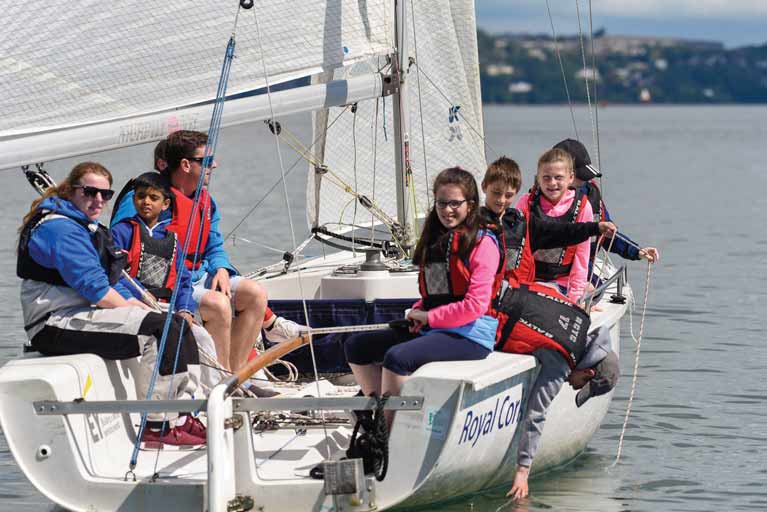 School children enjoy a taste of sailing in a Royal Cork 1720 in Cork Harbour Photo: Bob Bateman
School children enjoy a taste of sailing in a Royal Cork 1720 in Cork Harbour Photo: Bob Bateman
Converting “Try Sailors” to Members
Since 2017, through our Try Sailing programme, nearly 12,000 people have done just that. Also in that period membership of Irish Sailing has grown by 10% to 20,375, and while many factors drive membership, we believe this programme has played a significant part.
Our Database
The introduction of the EU’s GDPR in May 2018 meant that our databases had to be built again from scratch, but it now means that our data is “clean” and people are active and willing subscribers to our services, membership and information. Numbers now stand at just over 10,000, so there is still work to be done. Despite the new GDPR giving us the position of “joint controller” of membership data, a number of clubs have not returned data to us which is disappointing. It’s important to stress that the more data we have allows us to create a clearer picture of our membership which, in turn, gives sailing a stronger voice for the future when attracting sailors, new members, funding and sponsorship.
Club Coaching Programme
The newly developed Club Coach course aimed at providing certified coaches for entry-level programmes at club and inter-club level is now underway with two courses. Next year sees a further roll-out of the programme with at least one course per region.
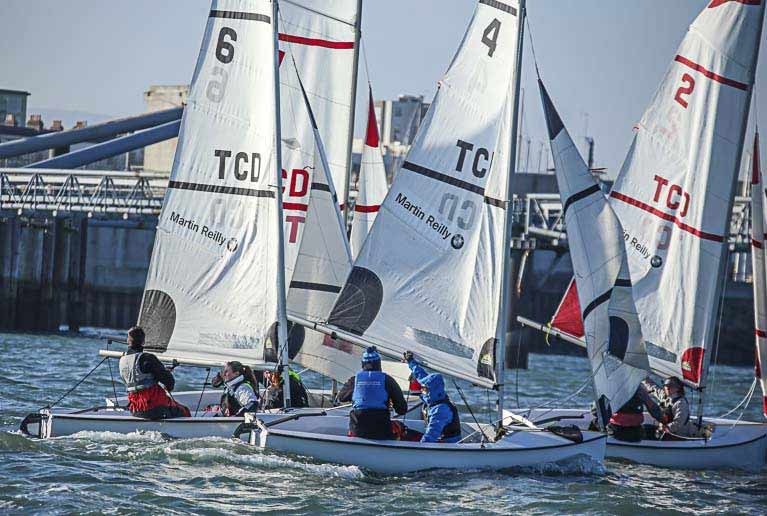 Team Racing at Dun Laoghaire Photo: Afloat
Team Racing at Dun Laoghaire Photo: Afloat
‘Keeping’ Third Level Students sailing
In July, Rory Martin joined the team implementing a new Team Racing initiative aimed at clubs and training centres. The programme aims to increase participation in club sailing amongst under-represented groups, including those at third-level, and to retain sailors at this level and beyond. Fifteen clubs have expressed interest with four clinics delivered to date.
More involvement of Women in Sailing
The first Irish Sailing Pathfinder Women at the Helm regatta was such a big success this year. Over 200 people took part and all the helms were women. Sport Ireland has endorsed this success by funding our new “Take the Helm” campaign next year as part of their Women in Sport Strategy.
Watersports Inclusion Games
This event, superbly hosted by the committed membership of Kinsale Yacht Club, saw 250 people from the physical, sensory, intellectual and learning ability spectrums take to the water each day in a variety of sports. A volunteer base of over 400 was a reflection of the incredible effort by so many to make this event a spectacular success. Anyone present knows what a privilege it is to be part of this event.
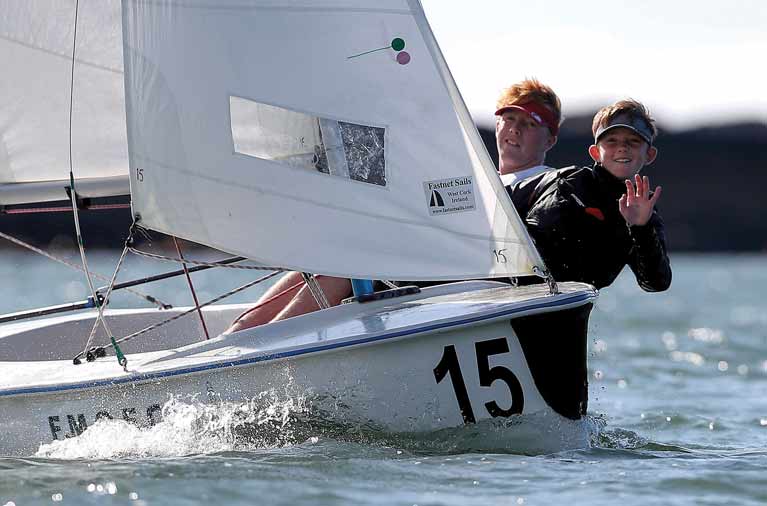 Cork Harbour brothers Chris and Olin Bateman became 2019 All Ireland Junior Champions in September. Photo: INPHO/Bryan Keane
Cork Harbour brothers Chris and Olin Bateman became 2019 All Ireland Junior Champions in September. Photo: INPHO/Bryan Keane
All Ireland Championships
The 2019 Irish Sailing All Ireland Championship, hosted by the National Yacht Club in October, was won by Michael O'Connor of the Royal St George YC, representing the SB20 class. The Junior Championship hosted by Dave Harte and his team in Schull was won by Chris Bateman of Monkstown Bay Sailing Club representing the RS200 class.
Looking ahead to 2020
Nearly 1000 people have engaged in the Strategic Review 2020-2025 process and I look forward to hearing their findings in the Spring. This review will be preceded by our National Conference and AGM on Saturday, March 21 in Dun Laoghaire with details to follow.
To those still sailing in the various winter series around the coast safe sailing; to those who have their boats winterised like myself enjoy the seasonal refitting plans.
As always you can find out more on our various channels (Facebook, Instagram and Twitter), via our website, or our weekly newsletter www.sailing.ie
Date for your diary: National Conference & AGM on Saturday, March 21st in Dun Laoghaire
Irish Sailing Launches New ‘Take The Helm’ Programme For Women
Irish Sailing has announced its new ‘Take the Helm’ programme for female sailors aged 16+ which is supported by Sport Ireland’s Women in Sport Programme, the campaign to increase female participation and progression in sport.
Take the Helm will provide training, competition and infrastructure opportunities to encourage and enable women to take the helm in a variety of areas:
- A flexible training fund for women providing bursaries for a choice of training to encourage regional programmes, develop participation and increase roles of leadership.
- Race official development for women to Take the Helm in the many roles involved in race management and support.
- Irish Sailing’s Pathfinder Women at the Helm will continue to support and highlight women’s sailing, encourage competition, retain young sailors and entice returning sailors.
- Promotion of participation: showcasing role models of all levels through storytelling, photography and videography.
The flexible training fund for women provides 24 bursaries of up to €400 each available on a first come, first served basis for all Irish Sailing clubs, classes and centres.
This bursary can be used to fund fully or partially any of the following for women aged 16 and over:
- The provision of an Irish Sailing certified women’s racing coaching programme, national powerboat training course and safety boat training course.
- The attendance of female instructors on the Irish Sailing courses for Senior Instructor; Advanced Sailing Instructor; Windsurfing Go With Style and/or Go Foil Instructor; and Powerboat and/or Safety Boat Instructor.
To give an expression of interest in receiving the fund, complete the short online survey HERE. For full details and how to apply, contact Gail MacAllister at [email protected]
Revenue ‘Yet To Reveal Changes For Oil Suppliers’ Ahead Of Upcoming Green Diesel Ban
With only seven weeks until the ban on the use of green diesel for private pleasure craft comes into force, the Revenue Commissioners have yet to formally declare to oil suppliers what changes are required under the new legislation, according to Irish Sailing.
Come 1 January 2020, marked (or ‘green’) gas oil will no longer be permitted for use in private pleasure navigation, bringing Ireland into line with EU law in the wake of a ruling by the European Court of Justice last year.
The penalty for having green diesel in a pleasure boat tank could be as much as €5,000, which Irish Sailing suggests is double the average penalty for cars.
And it adds that details of the new regime — which means such vessels must be powered by unmarked or white diesel — have yet to be revealed to the leisure boating community.
“It has been pointed out to the Revenue that some boats refuel at longer than annual intervals and will therefore likely have some green in their tanks for a long time to come,” it explains.
“It is not known at this stage how this will be policed and while it is possible to measure the proportions of white/green through a test, rather than a simple colour check, it is not known what type of checks will be made — where or when.
“The enforcement may come in at the point of sale, making the providers responsible for policing the sale of green, and we have to assume that suppliers will refuse to put green diesel in a leisure vessel.”
Irish Sailing has provided a guide for leisure boaters on white diesel refuelling sites around Ireland, as compiled by Norman Kean.
As of now, the ports of Howth, Dun Laoghaire, Greystones, Crosshaven have confirmed the switch to white diesel with two or three pumps, while Kinsale will have one or two. No decision has been made at Malahide and Kilmore Quay.
Other ports will be less convenient. Carlingford, Arklow and Dingle will have white diesel in cans, though customers may have to provide the cans at Carlingford and Arklow.
Castletownbere, Bantry and Dingle will have white diesel by tanker available “in modest quantities and at relatively short notice”, as is traditionally the case for green diesel at these ports.
Elsewhere, local filling stations will be the only available source for white diesel.
Roundstone in Connemara has a filling station within 200m of the pier, but Sligo will require a 500m walk, while boaters at Killybegs will face a 2km round trip on foot to refuel.
The advice for now, Irish Sailing says, is to “keep receipts when you fill, so you that you can prove you have ‘gone white’”.
Ireland’s 49ers Fly To New Zealand This Weekend For Worlds Preparations
The Irish Sailing 49ers are getting ready to fly to New Zealand tomorrow, Saturday 9 November, ahead of their World Championships next month.
There’s a long list of logistics to prepare for before racing starts at the 49er Worlds in Auckland on 3 December.
Ryan Seaton and Seafra Guilfoyle and fellow duo Robert Dickson and Sean Waddilove are heading out early to train and acclimatise for the competition, which is also their next chance to secure an Olympic place for Ireland in the 49er class at Tokyo 2020.
As previously reported on Afloat.ie, the skiff pairs also have a new coach in Matt McGovern, who previously represented Ireland at the Olympics with Seaton.
Matt McGovern Rejoins Irish Sailing Team As 49er Coach
Former Irish Olympic 49er sailor Matt McGovern has rejoined the Irish Sailing team as coach in the two-handed skiff class.
McGovern, who represented Ireland in the 49er at London 2012 and Rio 2016 with Ryan Seaton, retired from active competition in February last year and subsequently took up the role of high performance manager with the RYANI.
He will now assume coaching responsibilities for the two Irish Sailing 49er teams, which include his former skiff partner Seaton’s duo with Seafra Guilfoyle. The pair placed sixth in the World Cup medal race at Enoshima, the site for next summer’s Olympics, this past August.
Robert Dickson and Sean Waddilove, 2018 U23 49er World Champions and Volvo Irish Sailors of the Year, will also benefit from McGovern’s Olympic experience.
Irish Sailing head coach Rory Fitzpatrick said: “It’s great to have Matt join the coaching team. An accomplished athlete, he’ll bring a wealth of experience to the whole team. He is also one of the most organised and prepared athletes.
“In our Performance HQ we have a picture of him and Ryan in the workshop — it’s placed there as a reminder of Matt’s attention to detail, and something we want to inspire the younger athletes with.”
McGovern joins the team ahead of Ireland’s next bid for a place at Tokyo 2020 in the 49er Worlds this December.
Exploration & Discovery at the 2020 Irish Sailing Cruising Conference
Exploration and Discovery is the theme for the 2020 Irish Sailing Cruising Conference at the National Yacht Club on 15th February 2020 at Dun Laoghaire Harbour in County Dublin.
Met Eireann Meteorologist and Wave Expert, Sarah Gallagher, will be talking about waves and how we can forecast them and the effects they have on our shores.
The highly respected ornithologist and Antarctic wildlife tour leader, Jim Wilson, will be sharing the story of the discovery of Antarctica by Irish man Edward Bransfield – yes a Cork man was the Leader of the first expedition to see and chart the Antarctic Mainland on 30th January 1820.
Damian Foxall, Niall MacAllister and Lucy Hunt, currently known as Team South, are leading a series of expeditions in Antarctica this winter and will be sending us a message from the ice and give a on the ground feel for life out there and what Bransfield would have seen.
There will be a ‘fireside chat’ with Jamie Young, Expedition Leader, Skipper and owner of Killary Adventure Centre, catching up on his trip to Greenland and the Arctic Circle and what he has learnt from his icy adventures.
Racing sailor and adventure cruising sailor, Christine Heath, will share her travels sailing her Sadler 28 to Holland, Sweden, Norway and Scotland these past few years. She is now nestled in Kilrush Marina and looking forward to exploring our wonderful west coast in 2020.
Vera Quinlan returns to the conference by video to share the latest developments on her family cruising adventure sailing round the Atlantic Circle.
Tony O’Leary of Union Chandlery gives some professional advice on anode types and galvanic corrosion and more environmentally friendly anode options.
Norman Keane has been busy sailing round Ireland with his drone and will present a birds-eye view of our ports and harbours.
Cruising Association of Ireland will give us an insight into their plans for 2020 cruising.
Royal Cork Yacht Club share their plans to celebrate Cork300 with the Wild Atlantic Way Cruising in Company.
Plus breakout workshops … details to follow nearer the date.
Union Chandlery is back on board as event sponsors for the 4 years running now and in true Union Chandlery style they will be giving away a bonus prize on the day and goodies for everyone.
Kilrush Marina and Cruising Association of Ireland are joining the event again as supporters. The support of these organisations helps to keep the entry fee down to cover bare costs and keep this fantastic event accessible to everyone.
The conference will also have limited spaces for marine industry companies and agencies to promote their goods in a small expo. If you are interested in exhibiting please contact Gail on [email protected].
Space is 100 seats, so early booking is recommended here
Sailors for the Sea Platinum Clean Regattas Certification Achieved by Irish Sailing Women at the Helm
Irish Sailing Pathfinder Women at the Helm event has been awarded the prestigious Platinum Clean Regattas Award from Sailors for the Sea.
This is the highest award possible with the Sailors for the Sea Clean Regattas programme, which is the world’s only sustainability certification for water-based events. So we are up there with Kiel Week, Rolex Big Boat Series and 11th Hour Racing.
The key to the success of a “Clean Regatta” at any level, is the implementation of a Sustainability Ambassador and a ‘Green Team’. This award was achieved with the support of the National Yacht Club, the cooperation and enthusiasm of the event participants, the commitment by race officials and great teamwork by the event ‘Green Team’ members Gail MacAllister, Susan Spain and Tim O’Brien.”
Tyson Bottenus, Director of Clean Regattas told the team “This is an amazing accomplishment and on behalf of all of us here at Sailors for the Sea I’m proud to award you with a Platinum level certificate and medallion.”
Platinum status involves achieving 70 out of 75 “green” practices to reduce the impact of an event on the environment and leave a legacy of new habits and awareness. Clean Regattas has 4 levels an event can work towards based on their own capacity – Bronze, Silver, Gold and Platinum.
Irish Sailing Pathfinder Women at the Helm has left a legacy of assets that all clubs, centres and classes can dip into and help achieve certification for their events. If your club or class wants to work towards creating ‘greener’ events Irish Sailing have a sample NOR and SI recommendations, posters and basic guidelines on taking a step further into the consideration travel and product sourcing here
You can take a look at the event’s own sustainability page here
Irish Sailing’s Sustainability Officer Gail MacAllister is happy to give advice to any club, class or centre that wants to reduce their environmental impact - [email protected]
Have Your Say In Irish Sailing's Strategic Review
Sailors and boaters and other stakeholders in Ireland still have two weeks in which to contribute to Irish Sailing's strategic review for its next five-year plan.
In conjunction with regional consultation meetings, Irish Sailing says it wants to garner input from all stakeholders via a short online survey.
This survey should take no more than five minutes to complete and will be available until Thursday 31 October.
Irish Sailing chief Harry Hermon has discussed the governing body's challenges future vision in a recent podcast with Tom MacSweeney, while this past weekend our own W M Nixon expressed positivity for the vast potential of sailing in Ireland.
What Is To Be The Future of Irish Sailing?
My Podcast this week is an interview with the Chief Executive of Irish Sailing, Harry Hermon, in which he discusses a decline in yacht ownership, lifestyle changes which have reduced the time people can give to organised club sailing, the need for more government investment in facilities for boating around the coast and the challenges facing sailing, powerboating and windsurfing in Ireland over the next five years.
The national governing body for the sport has been holding a series of meetings this week to get the views of members, clubs, sailing centres and individual sailors to help frame the development of its next strategic plan – for the years 2020 to 2025. The last one was somewhat controversial.
I attended the first meeting, held in Cork. Others were at Cullaun Sailing Club; in Castlebar and Greystones Sailing Club. The final one is scheduled for next Wednesday, October 8, at Howth Yacht Club.
The Cork meeting heard a lot of concern about a declining level of yacht ownership and lifestyle changes which have reduced the amount of time that can be given to participation in club activities, including racing. The trend of more motorboats and powerboats being sold was identified as a trend affecting sailing. The main positive for the sport is seen as being a sport for all, at all ages.
I discuss all these issues with Harry Hermon in the Podcast below.


























